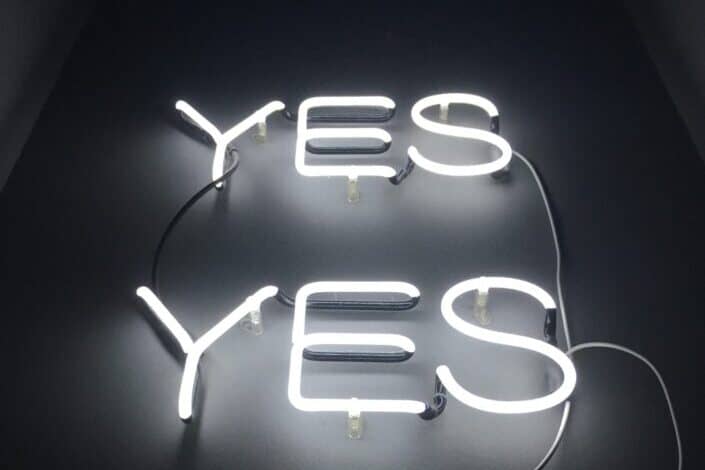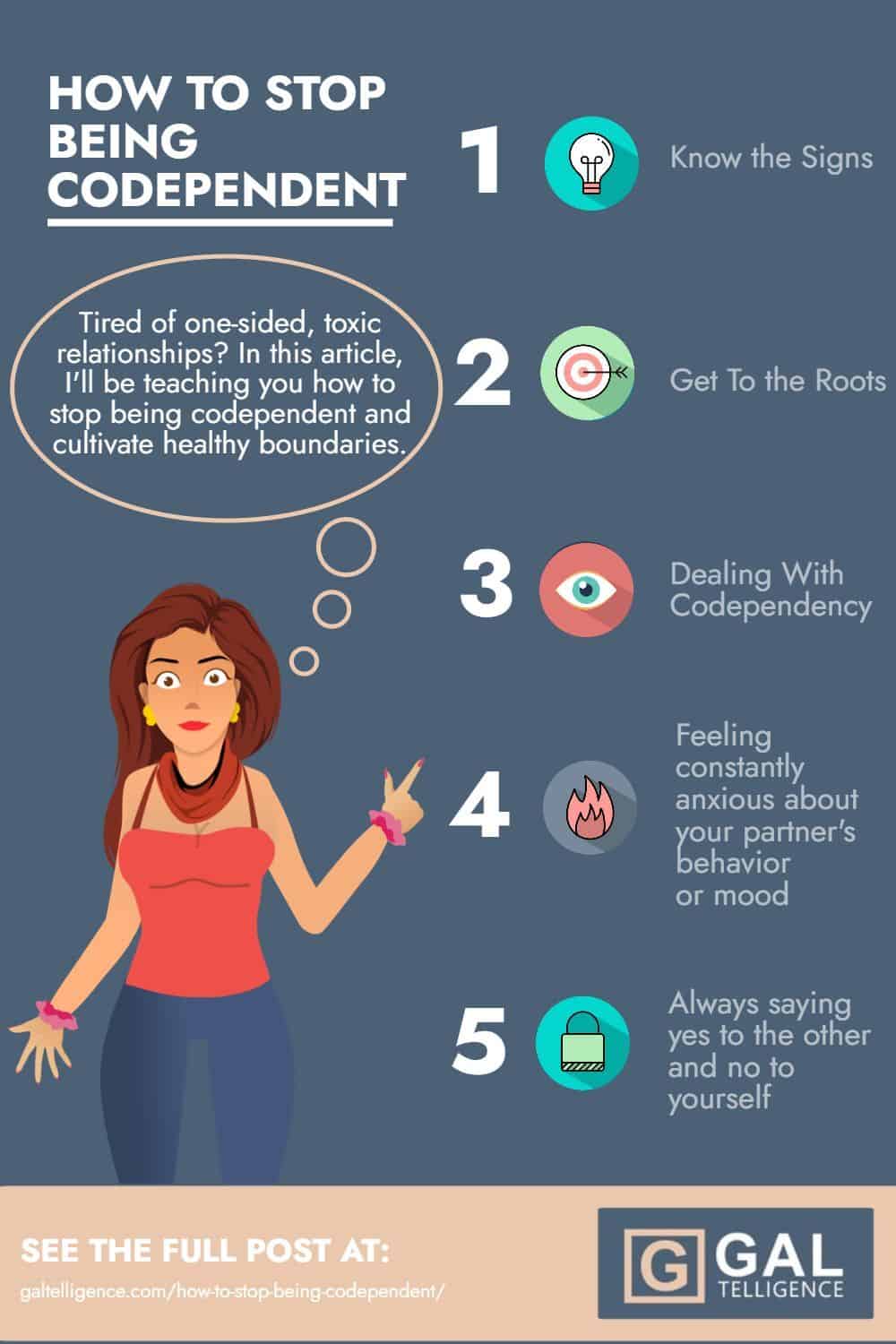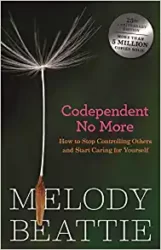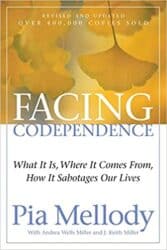
via: Unsplash / Alvin Mahmudov
Today I'm teaching you how to stop being too dependent and cultivate healthy boundaries.
Being in a relationship with someone displaying codependent tendencies is one of the many signs you're in a toxic relationship.
From helping women understand why men pull away to helping hopeless romantics spot a serial dater, I've written countless articles to help you with your relationship woes.
In this article, we'll be talking about codependent relationships, signs of a codependent behavior, and how to stop being too reliant. If you want to know if you're in one, read on.
Contents
What Does Codependency Mean? Is It Bad or Good?

via: Unsplash / Allef Vinicius
Codependency is a dysfunctional relationship dynamic where one person is excessively reliant on the other- emotionally and psychologically.
In a codependent relationship, one person often gives more than enough, while the other takes more than what's necessary. In fact, according to family and marriage therapist Vicki Botnick, codependency usually involves a sense of forgetting "where you end, and your partner begins."
And while it isn't considered a mental illness, codependency is an unhealthy behavior and is often referred to as "relationship addiction."
Nothing good ever comes out of being in a codependent relationship. It takes a toll on your mental health, poisons your other relationships, gets in the way of your responsibilities, and lessens your chances of ever finding healthy love.
How To Stop Being Co-dependent: Breaking The Cycle

via: Unsplash / Jose Aragones
Every relationship requires a certain amount of give-and-take, but sometimes couples find themselves on the wrong end of the stick and start an unhealthy cycle of codependency.
If you find yourself trapped in this kind of toxic relationship, don't lose hope. You can help it.
But first, you have to understand where it's coming from, recognize codependent patterns, learn how to deal with a codependent partner, and of course, how to cultivate self-love and healthy relationship boundaries.
1. Know the Signs

via: Unsplash / Sir Manuel
Unhealthy behavioral patterns in codependent relationships are often mistaken as acts of love, especially for someone who has never been in a romantic relationship or never had an exemplary role model of a healthy relationship.
Being able to recognize the signs of codependency and patterns of codependent people is a must if you want to break free from this toxic cycle.
The key signs of codependency include:
Sign #1: Feeling constantly anxious about your partner's behavior or mood.

via: Unsplash / Michael Easterling
Couples in a codependent relationship are perpetually tied at the hip, and one of the tell-tale signs you're in one is when one or both of you are excessively concerned about each other's habits and behaviors.
Of course, when you're in a healthy relationship, it's only natural to be in touch with your partner's feelings or emotions. However, in codependent relationships, couples often hyper-focus and react based on their partner's mood and reflect their feelings rather than their own.
Sign #2: Always saying yes to the other and no to yourself.

via: Unsplash / Michèle Eckert
Lack of boundaries is another prominent indicator of codependency. Codependent individuals find it difficult to recognize, reinforce, or respect boundaries.
On one side of the coin, a codependent person or the giver would overcompensate and take on more work than they could handle to earn validation from people or as an attempt to lighten their partner's "burden."
On the other hand, the taker will try to manipulate every situation to gain control and rely on the giver to meet their needs.
Sign #3: Being emotionally disoriented based on your partner's actions or feelings.

via: Unsplash / Anthony Tran
Spending some time apart to make time for yourself, your interests, and your hobbies is necessary to maintain a healthy romantic relationship. Not only does this recharge your soul, but it also helps couples maintain a sense of independence.
However, in a dysfunctional relationship, codependent individuals will choose not to do anything without the other from fear that their partner might do something behind their back or simply because, without the other, one just lacks the confidence to do things on their own.
Sign #4: There's no peace or satisfaction in the relationship.

via: Unsplash / Dev Asangbam
With all that going on, it's inevitable to feel resentful and hostile in a codependent relationship. Frequent fights, feeling stressed, stagnant, or stuck in the relationship, and not feeling turned on to your partner are also some of the lingering and conflicting feelings present in a codependent bond.
Sign #5: Displaying a poor sense of self.

via: Unsplash / Luis Galvez
A codependent partner will often show a lack of self-image and poor self-esteem. Some would need constant approval from others to have a sense of purpose, and some would overly rely on their partners for their basic, emotional, and even social needs.
2. Get To the Roots

via: Unsplash / Nik Shuliahin 💛💙
Getting to the root of the problem is always the first step in solving it. If you're in a codependent situation or a loved one is showing codependent traits, tracing back to how it started will help you deal, heal, and break free from codependency. People with codependency problems tend to lack self-esteem and display people-pleasing behaviors, abandonment issues, trust issues, and an anxious attachment style.
Most of the time, these people were neglected as children and were not allowed to express themselves, be seen, or heard, creating a deep inner wound that caused them to desperately seek their sense of self through others. Codependency can also be adopted or learned from a family member who displayed similar behaviors or from being in an abusive relationship.
3. Dealing With Codependency

via: Unsplash / Allen Taylor
Now that you understand what codependency is and all the red flags that come with it, your next step is to identify any repeating patterns in your present and past relationships. These patterns, which were rooted in childhood or adopted from a cycle of abusive relationships, will persistently play out until you do something about them.
Next, practice building self-compassion by honoring your needs, wants, and feelings. Change always starts with yourself so if you want to have better relationships, start by being kind to yourself. Be your own person outside of your relationships, figure out what you love to do, take on a new hobby, engage in healthier self-talk, and build better self-care habits.
Lastly, set boundaries for yourself and learn to recognize when you've gone too far in putting others first. If you or your partner are struggling with substance abuse, there are a lot of helpful resources for addiction treatment. Co-Dependents Anonymous, for example, offers a twelve-step program that aims to help people build and nurture functional and healthy relationships. Alcoholics Anonymous and other sobriety programs provide addiction treatment and help curb substance use disorder.
For accountability and proper guidance, seeking professional help and undergoing therapy is a good place to start.
Codependency versus Interdependency: What's the Difference?

via: Unsplash / Elena Mozhvilo
Every relationship begins with a mutual connection, and while it is necessary to be emotionally in touch with your partner, there is a fine line between reciprocity and over-reliance. Unlike stable and healthy relationships where equal partnership exists, codependency is a one-sided, mostly imbalanced connection. One partner bites off more than they can chew while the other sits on the sidelines, freeloading their way through the relationship.
In an interdependent relationship, couples are able to nurture each other emotionally without sacrificing their independence and individuality for the relationship.
If you want to avoid being in a codependent relationship, you must first cultivate a strong sense of self. Taking time to get to know who you are, what your values are, what you're passionate about, and setting a healthy standard for the people you want in your life is a must before you enter into any relationship.
Building Healthy Boundaries In Relationships: Why It's Important

via: Unsplash / Jonathan Borba
Time and again, we've been taught that balance is key in everything. What you choose to do, say, or feel creates a ripple effect in your life and sets the tone for everything in it- your well-being, lifestyle, career, friendships, and romantic relationships.
Respecting other people's boundaries and setting your own is essential for a healthy relationship. Boundaries are important because they serve a critical role in establishing safety and trust in a relationship, says marriage and family therapist Janet Parks.
More than that, setting and building healthy boundaries ensure that you're both growing as individuals while staying committed to each other.
1. Clearly define your needs and limitations.

via: Unsplash / Harli Marten
If you want to manifest a healthy and loving relationship in your life, you must first identify what you need and where you draw the line in your relationships.
What do you need in a partner? What do you expect in a romantic relationship? What are you willing to do for a relationship? What qualities are you looking for in a partner? What are your deal breakers?
These are only some of the introspective questions you need to ask yourself when defining your boundaries.
2. Listen to what your partner needs.

via: Unsplash / Annette Sousa
Conversely, it is also important for your partner to feel seen and heard. It takes two to tango, and just like any successful relationship, acknowledging and honoring your partner's limitations is necessary.
3. Practice healthy communication and get comfortable with uncomfortable conversations.

via: Unsplash / a befendo
Relationships are easier when both partners practice honest and transparent communication, so creating a safe space for difficult conversations is crucial. Practice listening and responding with compassion, understanding, and respect, and watch how it radically improves how you and your partner handle conflicts.
3 Best Books For Recovery From Codependency
Are you tired of people taking you for granted? How about one-sided relationships? Fresh out of an unhealthy relationship?
These books are for the weary hearts looking for a fresh start. The people's first-hand experiences, life stories, and expert pieces of advice will help you identify codependent patterns and foster a healthier relationship with yourself and others.
1. Boundaries: When to Say Yes, How to Say No to Take Control of Your Life - Henry Cloud, John Townsend
Empathy without boundaries is self-destruction. There is a difference between caring for other people and carrying their burdens for them.
This New York Times bestseller from Christian psychologists and authors Henry Cloud and John Townsend provides biblical insight and applications on learning when to say yes and how to say no, setting healthy boundaries, and taking control of your life.
2. Codependent No More: How to Stop Controlling Others and Start Caring for Yourself - Melody Beattie
Do you always feel like it's you against the world? Have you ever thought that maybe it's just you bearing everyone's problem on your shoulders?
From best-selling author Melody Beattie, this healing book is a personal guide for people recovering from codependency. Filled with real-life stories, personal musings, and helpful exercises, Codependent No More is your way out of the woods and into a happier and more fulfilling life.
Facing Codependence: What It Is, Where It Comes from, How It Sabotages Our Lives - Pia Melody, Andrea Wells Miller, J. Keith Miller
Sometimes, the best way to change your life is to sit down, get honest with yourself, reflect on the choices you've made, and figure out how it all affected the quality of your life. Facing Codependence is a self-help book that gets to the root of codependency and helps you trace back, heal, and grow from life traumas that are damaging and affecting your relationships.

via: Galtelligence
Share This Image On Your Site
Frequently Asked Questions

via: Unsplash / No Revisions
Being in a dysfunctional relationship is no laughing matter. The constant stress from being in an abusive situation can take a toll on you and may cause physical, mental, and sometimes fatal traumas. Here are more things you need to know about codependence:
How does it feel once you've recovered from codependency?
Recovering from codependency is a process, and although it may not be linear, there are green flags to watch out for that indicate you're better than ever.
One, you're able to set realistic expectations for yourself. You now understand that you're not perfect and don't expect yourself to be one. You are now more comfortable in your own skin and aren't dependent on anyone's approval.
Second, you are more in tune with yourself. You've gotten better at regulating your emotions and not letting them get the best of you. You now have a better self-care habit, don't dwell on bad energy, and are wiser when it comes to the people you surround yourself with.
Most importantly, you are at peace. Your once chaotic life is now replaced by a more quiet but happy and fulfilling one.
What are codependents afraid of?
Neglect is one of the harder causes of codependency. It breeds fear, anxiety, and confidence as tough as an eggshell.
And since codependency usually comes from a cycle of abuse and neglect, a codependent individual may even be unaware that they are one. They fear rejection and will go out of their way to please people. Most of the time, at their own cost.
How much time does it take to recover from codependency?
As I said, codependency recovery isn't linear. Bad habits die hard, and there will certainly be good and bad days. But how fast you recover totally depends on you. Yes, it may take time to get better, but if you continue to make healthier choices for yourself and your relationship, you'll get there in no time.
Instead of seeking approval from other people, work on your self-worth and rediscover your passions, things that make you happy, and surround yourself with people who help you become a better person.
More Relationship Tips To Explore
Sometimes you win, other times you lose, and though you might have to take a pounding from time to time, there are ways to help you get over a broken heart.
- If you feel like you'd be better off ending a relationship, then maybe you are. If you're wondering how to break up with someone, ask no further.
- The heart wants what it wants, and if you can't take a hint, you better learn to recognize signs he's not into you.
- Okay. So you've ended it, and now you feel awful. Don't know how to get over a breakup? Well, now you'll know.
- You like this guy. Is he into you? Will he ever notice you? Are you just waiting in vain? Stop second-guessing. Here are signs he doesn't want a relationship with you.
In Conclusion
Now that you know how to stop being attached, it should be easier to recognize codependent tendencies and stay away from toxic people. Codependency is a learned behavior, and though it might take you some time to recover, healing and growing through it is always possible.
Knowing the signs, getting to the roots of it, and learning how to deal with it effectively are necessary steps you have to take. Remember, hurt people hurt people, so if you've been wondering how to stop being too reliant, start with yourself.
If you're curious to know why men pull away or the signs you're in a toxic relationship, check out my other articles here.

















